Wego
2019 • App design • 10 weeks • UX Design + Research
My Role
Solo student project, submitted as part of General Assembly's User Experience Design course.
Methodology
- User interviews
- Directed Storytelling
- Card Sorting
- Comparative Analysis
- User Persona
- Thematic Analysis of Qualitative Data
Problem
Group travel is stressful and complicated to plan
As someone who enjoys traveling, I've noticed that group travel seems to be broadly difficult to plan and stressful for myself and my peers. This led me to the question- how can I simplify the group travel experience to be more collaborative, organized, and less stressful for millennial travelers aged 24- 35?
The solution
Simplify collaboration
The result is a mobile application, “Wego,” that consolidates the functions of multiple platforms into one, centralizing collaborative planning and communication, with the aim of making group travel simpler and more enjoyable.
“Wego” is a mobile application that aims to create a shared sense of connection and harmony for users by simplifying the more stressful aspects of group travel, such as decision-making, communication, and information management, in order to allow users to stay in the moment and enjoy their shared travel experience.
White paper research
Millenials travel more than any other demographic, and 58% of them do so with others...
"Technology is not something new for the millenarians. They grew up with smartphones in their hand and benefited from innovative applications that make life seem a little easier. Hotels need to keep up with the times and technology. Consideration needs to be given to developing facilities to meet the expectations of this category of customers...” (Sofronov, 2018)
Comparative Analysis + The Gap
The competition had no in-app features to support group trip planning.
I compared the 3 most popular travel applications according to the Apple App Store- Hopper, Vrbo, and TripIt. In order to focus on existing resources to manage and plan travel, I didn’t include other resources that people mentioned in the interviews such as Facebook Messenger, Excel spreadsheets, and text messaging.



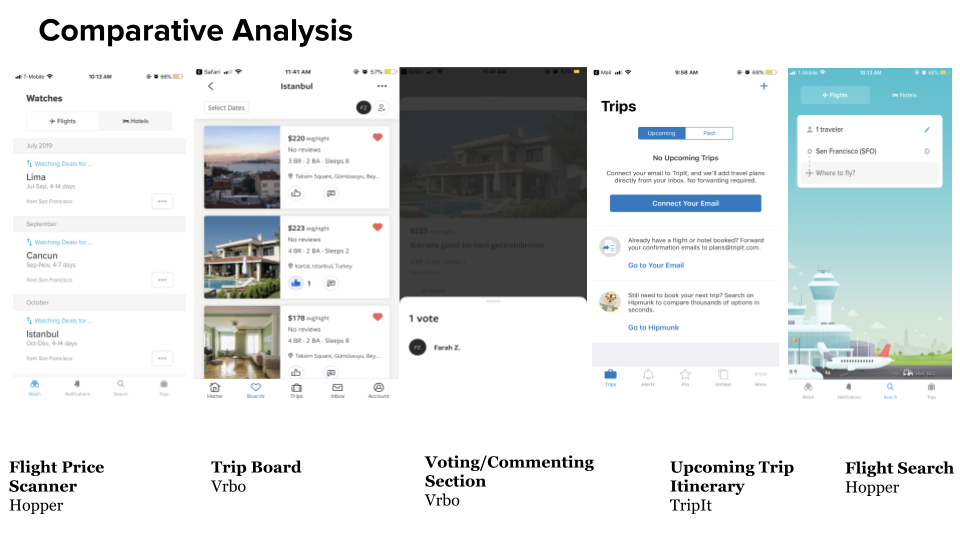
Standout features:
- Trip Board
- Commenting + Voting
- Visual Cues + Iconography
User Interviews
I snowball sampled 10 avid travelers for interviews and directed storytelling. The goal was to understand how people traveled, what services they utilized to plan their trips, and what pain points existed for them. I asked the questions below to find trends in their experiences and organized my data through affinity mapping.
Research Questions:
- Tell me about your recent travels. What type of traveling do you prefer (solo, goup, agency)? Why?
- Tell me about the last trip you took with a group. What stands out about the experience?
- What are the best and worst parts of traveling in a group?
- How do you usually go about planning a trip?
- What do you wish was different about the experience as a whole?
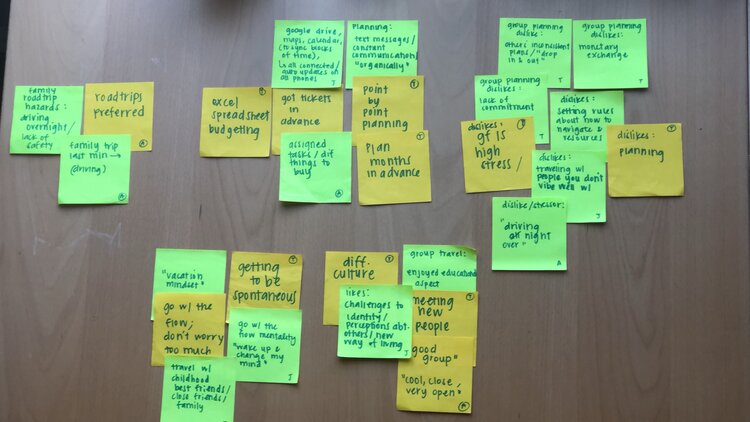
The Young Traveler Persona
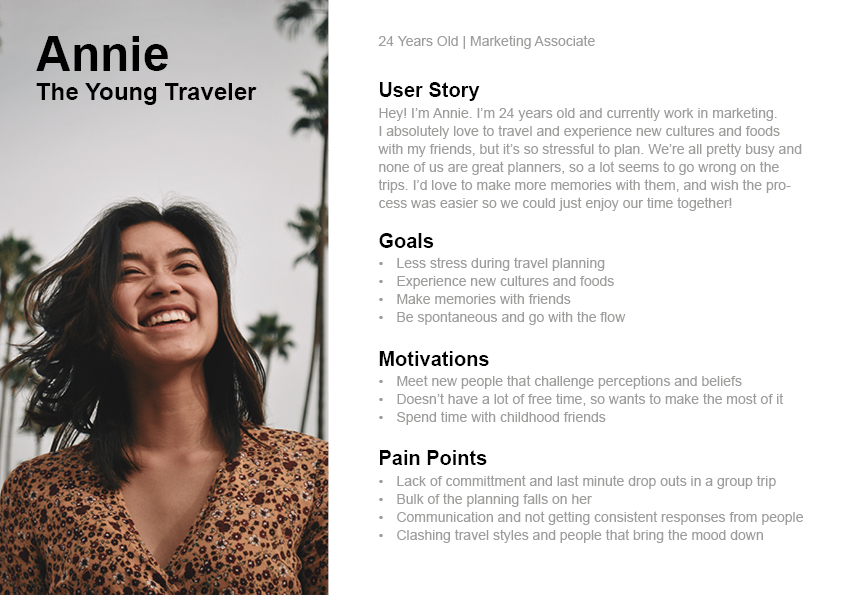
The main insight
Use of multiple platforms to plan one trip is decentralized and exhausting
Travelers reported using a range of tools including Excel sheets, Google calendar, Google docs, Hopper, text messaging and Facebook messenger to plan a single group trip. Adapting the functions of each into one platform could streamline and simplify this process.
Major Insights
Theme 1: Organization
Travelers consider themselves bad planners and experience stress during group trips as a result
The responsibility of organizer falls on one person and creates an unequal share of work
Planning feels disorganized and hard to track of across multiple platforms
Theme 2: Communication
Ongoing communication and timely responses are difficult to maintain for group trips
Lack of committment and last minute drop outs create frustration leading up to the trip
Decision making is difficult and time consuming
Theme 3: Traveling style
Travelers want to maintain a vacation mindset, make memories, and experience challenges to their perception from immersion in a new culture
There is tension in groups between a desire for spontaneity and structure
A good group is very important, as those who are too demanding or unable to relax can bring the mood down
Prototype
Iterations + Improvement
User research was applied to inform design decisions about the information hierarchy and essential functions for the prototypes of the application. Then with feedback and multiple iterations at every stage, I created a layout for the Wego mobile application using Sketch and InVision.
Low Fidelity Sketches
These are the low fidelity sketches of the various screens in the Wego application.
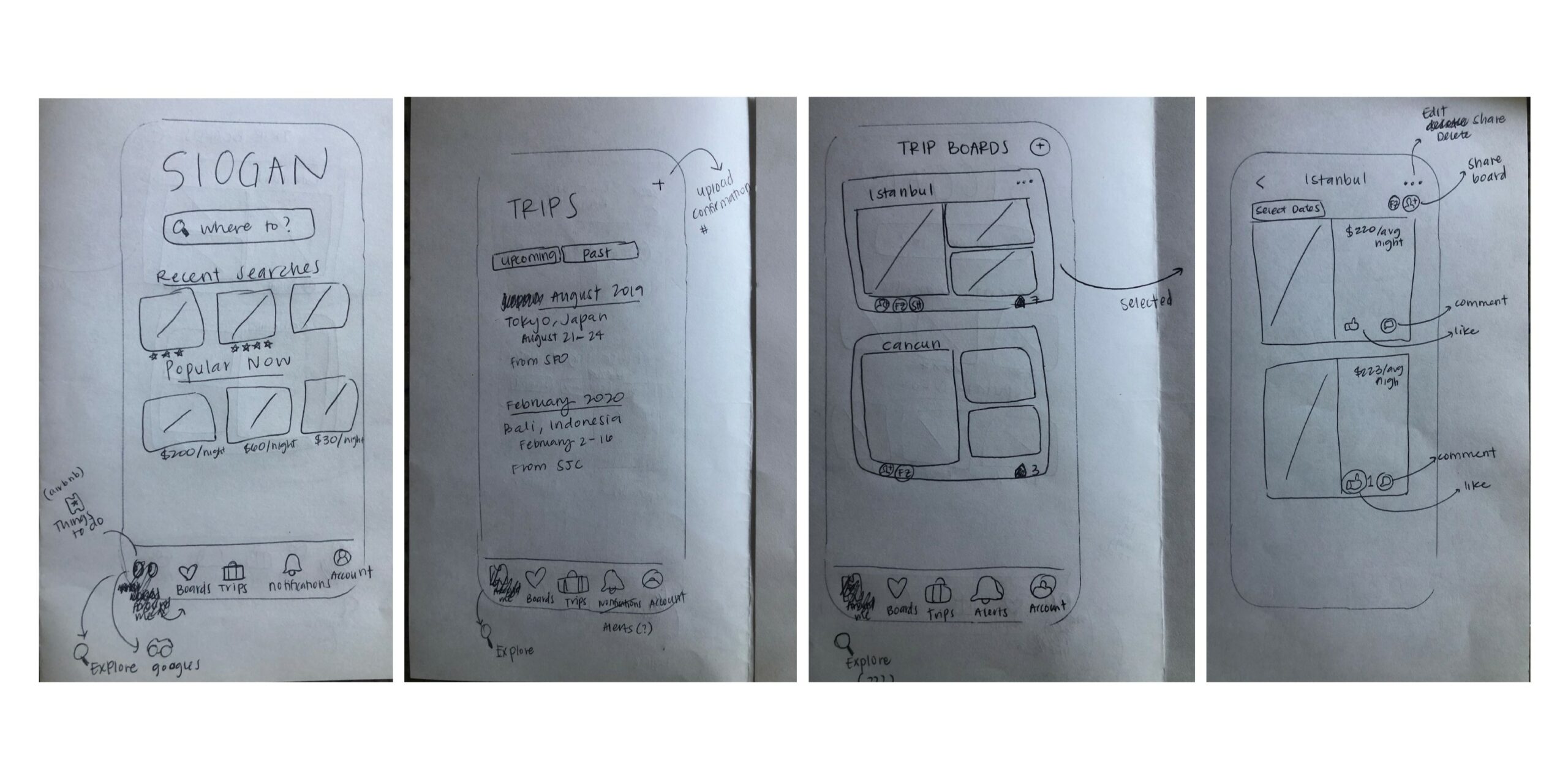
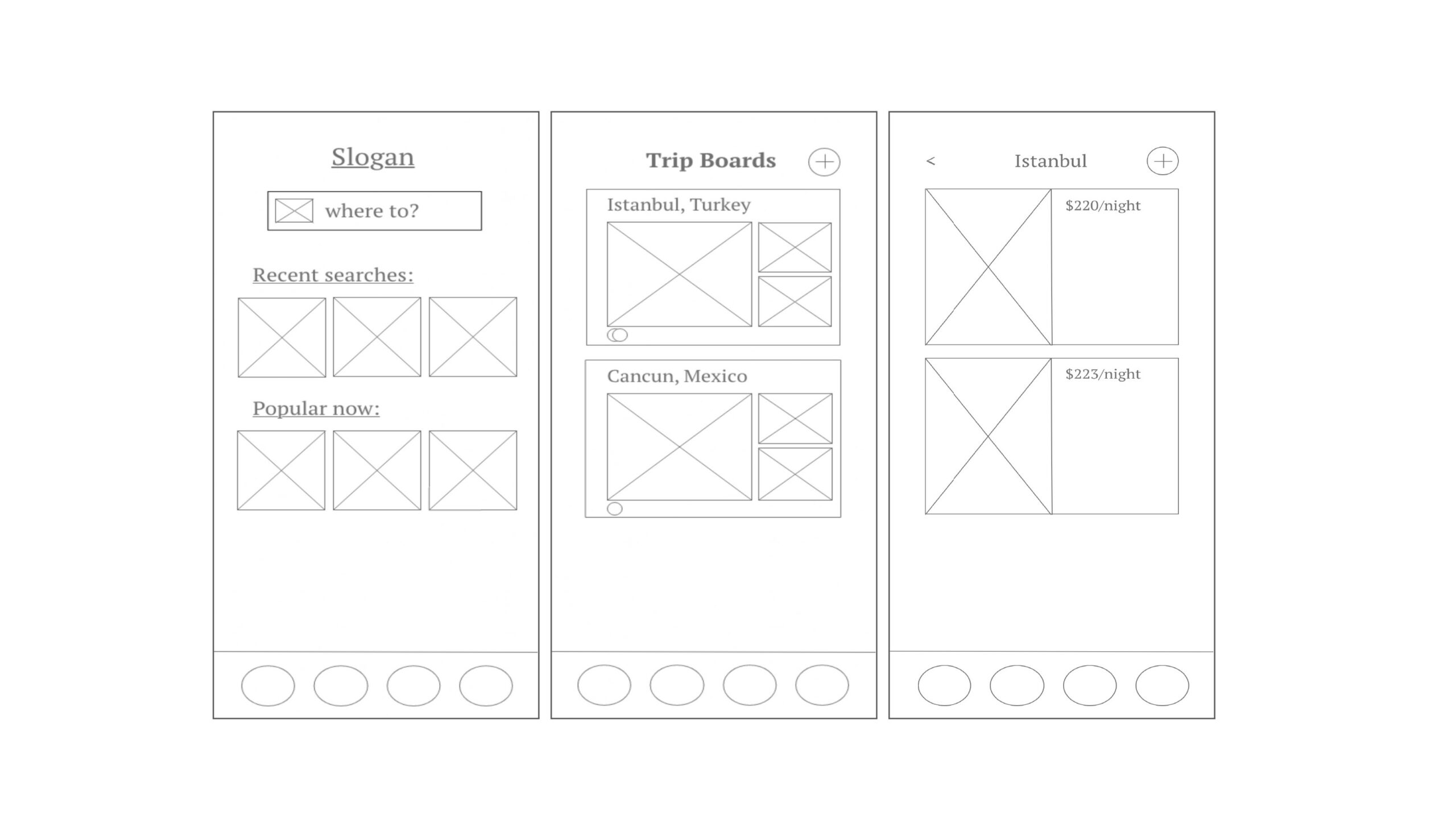
Wireframes
Using Sketch, I created cleaner simplified versions of the home screen, trip boards, and selected trip view.
Final Outcome
And finally, I created a landing page and further built out the selected trip screen using InVision. The additional organizational tabs were added at the top to separate the lodging, expense sheet, and notes.
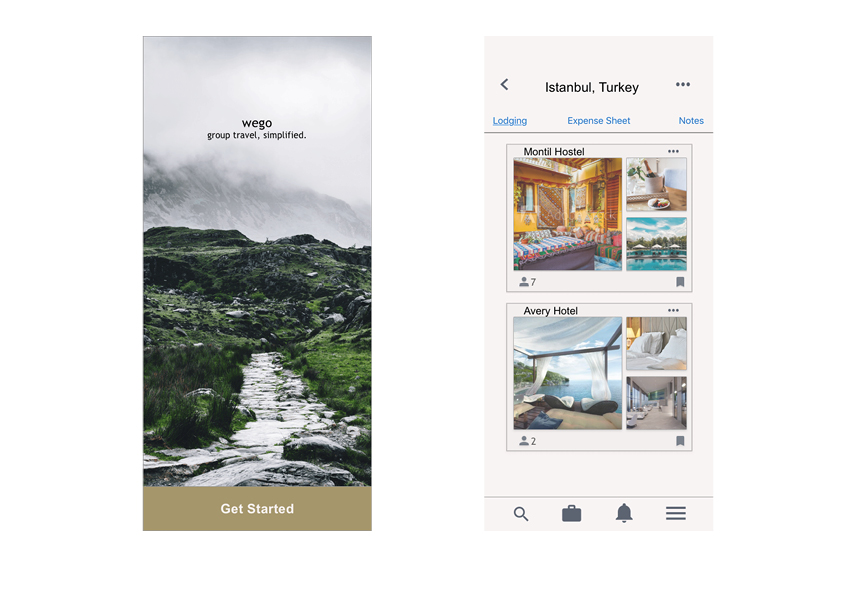
Lessons Learned + Future directions
Reflections + What I would do differently
This was my first solo UX project, and it's a thrill to complete it and get to add it to my portfolio! I'm proud of the user-centered and ethical approach I took in the research process. At the same time, this was completed in 2019 and my UI design and proficiency with design tools had a long way to go. I am including the screens as is, rather than redesigning them now in 2023, as a form of transparency in my process and where I was at the time. During the course of this solo project, I gained valuable insights and skills that have significantly shaped my understanding of user experience design and problem-solving. Here are the key reflections and lessons I've learned:
- Holistic User Journey Mapping: In retrospect, I comprehend the significance of delving deeper into the user journey, encompassing pre-trip, during-trip, and post-trip phases. This approach would empower me to envision a more comprehensive solution that caters to users' evolving needs at every stage.
- Diverse User Testing Panels: Looking ahead, I aspire to broaden the diversity of my user testing pool, capturing a wider range of perspectives and preferences. By incorporating participants from various age groups, backgrounds, and travel experiences, I can ensure a more inclusive and universally applicable solution.
- Seamless Integration of Travel Tools: Reflecting on the project's scope, I realize the untapped potential of seamlessly integrating external travel tools within the application. This enhancement could provide users with a unified platform to access essential travel resources without navigating between multiple apps.
- Continuous Ethical Consideration: While I championed ethical design practices during this project, I now envision a more structured framework for continuous ethical evaluation throughout the design lifecycle. This approach would align with evolving ethical standards and ensure a lasting positive impact.
- Evolution of UI Proficiency: As I juxtapose the original UI designs with my current skill set, I am driven to infuse my newfound proficiency into the "Wego" project. Redesigning select elements to showcase the evolution of my design aesthetics would provide a tangible testament to my growth.
In retrospect, this voyage illuminated both my strengths and areas primed for refinement. Armed with these reflections, I eagerly anticipate channeling these lessons into future undertakings, fortifying my commitment to user-centric innovation and design excellence.
Future Directions
Building on the foundations of the "Wego" project, there are several exciting directions to explore:
- Enhanced Collaboration Features: Expand the collaborative aspects of "Wego" by integrating real-time itinerary editing, group voting on activities, and AI-driven recommendations based on individual preferences.
- Intuitive Travel Insights: Develop a feature that provides users with insightful data analytics from their past group trips, enabling them to make informed decisions for future travels and enhance their overall planning experience.
- Augmented Reality Exploration: Investigate the incorporation of augmented reality (AR) to enhance the travel experience, offering users interactive maps, location-based information, and immersive cultural insights right within the app.
These future directions not only align with the initial goal of simplifying group travel but also open doors to innovative solutions that can further enrich the travel planning and exploration process for millennial travelers.
Farah Zia Ⓒ 2023